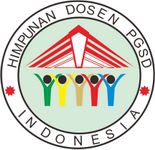Strategy for Instilling Trustworthy Character Using the Tumpe Method in Elementary School Students
DOI:
https://doi.org/10.31949/jee.v7i3.9651Abstract
The tumpe-based character education method is a strategy that is expected to be effective in instilling values and character education in elementary school students. This approach is implemented at SDN Negeri 1 Toili, Banggai Regency with a focus on cultivating the character of Trustworthiness (Integrity). The Tumpe method is a participatory and experiential learning approach that involves students in the entire process. The aim of this research is to find out what the trustworthy character education strategy is using the Tumpe method at Toili 1 Elementary School, Banggai Regency. This research method is a qualitative descriptive method, namely a method that relies on observation, interviews and documentation. The research results show that the strategy of instilling character in school-age students is very important to become their educational capital in the future. The TUMPE method is an educational method that is easy to apply.
Keywords: Strategy, Trustworthy Character, Method, Tumpe
Keywords:
include strategy, character, trust, Tumpe Method, studentsDownloads
References
Abidin, Z., Arizona, K., West, NT, & Physics, T. (2020). Project-based online learning is a solution for teaching and learning activities in the midst of the Covid-19 pandemic. Scientific Journal of the Educational Profession, 5(1), 64–70.
Adiputra, E. (2015). Unplanned buying behavior (impulse buying) in modern shopping centers in Surabaya (Vol. 1). State Islamic Institute of Tulungagung.
Alwisol. (2006). Personality Psychology.
Alwisol. (2009). Personality Psychology.
Asmani, J.M. (2011). Guidebook for Internalizing Character Education in Schools. Yogyakarta: Diva Press. Java Post Radar Bali. Com. “Deputy Chief of Police: Let's Preserve Nature for the sake of Future Generations.
Asriati, N. (2012). Developing students' character based on local wisdom through learning at school. Journal of Sociology and Humanities Education, 3(2).
Bukhori, B. (2014). Da'wah through Islamic guidance and counseling. Journal of Religious Counseling, 5(1), 1–18.
Chairiyah, C. (2017). Implementation of Character Education through Local Wisdom Values at Tamansiswa Jetis Elementary School, Yogyakarta. TRIHAYU: Journal of Elementary School Education, 4(1).
Damayanti, AE (2016). The Relationship between Body Image, Physical Activity and Knowledge of Balanced Nutrition with the Nutritional Status of Adolescent Girls. Airlangga University.
Danandjaja, J. (2002). Indonesian Folklore (Gossip Science, Fairy Tales, etc.), Jakarta: PT. Graffiti Main Library. Print To, 2.
Daryanto. (2008). Education Evaluation.
Erford, T. (2017). Bradley. 40 Techniques Every Counselor Should Know. Yogyakarta: Student Library.
Gerald, C. (2013). Theory and practice of counseling and psychotherapy. Bandung: Rafika Aditama. (Translated by E. Koswara).
Hamka, KPDI (2013). Jakarta: Pustaka Panji Mas, 1996. Human Rights Watch, In the Name of Religion: Violations Against Religious Minorities in Indonesia, America: Ttp.
Harsojo. (1998). Introduction to Anthropology:
Haviland, W. A. (1985). Anthropology. Translation by RG Soekadijo.
Japar, M., Zulela, MS, & Mustoip, S. (2018). Implementation of character education. Jakad Media Publishing.
Komalasari, G., & Wahyuni, E. (2011). Counseling theories and techniques. Jakarta: Index.
Kotler, P. (2002). Marketing Management, volume 1, millennium edition. Jakarta: Prehallindo.
Lamadang, KP, Supriatna, M., Sapriya, S., & Supriatna, N. (2023). Implementation of the Tumpe-Based Character Education Model in Early Childhood. Obsession Journal: Journal of Early Childhood Education, 7(6), 8072–8080. https://doi.org/10.31004/obsesi.v8i1.2258
Lamadang, K., & Supriatna, M. (2022). Value of Education in Malabot Tumpe in Batui Indigenous People of Banggai Regency. https://doi.org/10.2991/assehr.k.220402.003
Miles, M.B., Huberman, A.M. and Saldana, J. (2018). Qualitative Data Analysis. (Fourth Eddie).
Mulyati, A. (2015). Spatial pattern of settlements in Kauman Village, Yogyakarta. Gadjah Mada University.
NURIZKA, W.F. (2021). THE NYANGKU TRADITION AS A FORM OF EMBODIMENT OF THE ancestral values of the PANJALU COMMUNITY, CIAMIS DISTRICT. Siliwangi University.
Nursalim, M. (2014). Counseling Strategies & Interventions.
Peppers and Roger. (2004). Managing Customer Relationships.
Repita, LE, Parmiti, DP, Tirtayani, LA, & Psi, M. (2016). Implementation of Modeling Techniques to Minimize Oppositional Defiant Problem Behavior in Group B Children. Journal of Early Childhood Education Undiksha, 4(2).
Rohendi, E. (2016). Character Education in Schools.
Setiawan, E. (2011). KBBI Offline Version 1.3. KBBI Online (Third Edition) Taken from Http://Pusatlingual. Ministry of National Education. Go. ID/Kbbi.
Shaleh, AR (2008). Psychology An Introduction to an Islamic Perspective.
Subali, B., & Suyata, P. (2011). Guide to analyzing educational measurement data to obtain empirical evidence of validity using the Quest program. UNY Research and Community Service Institute: Yogyakarta.
Sudaryono, Rahayu, W., & Margono, G. (2013). Development of educational research instruments. Science House.
Sudijono, A. (2011). Education Evaluation. Jakarta: Raja Grafindo Persada.
Sudjana, N. (2021). The basics of the teaching and learning process. Sinar Baru Algensindo.
Sukardi, DK (2008). Introduction to the Implementation of the Guidance and Guidance Program in Schools. Jakarta: Rineka Cipta.
Sutama, GA, Suranata, K., & Dharsana, IK (2014). Application of Behavioral Theory with Modeling Techniques to Increase the Learning Independence of Class AK C Students at SMK Negeri 1 Singaraja for the 2013/2014 Academic Year. Undiksha Scientific Journal of Counseling Guidance, 2(1).
Willis, S.S. (2017). Individual counseling, theory and practice.
Zuchri, A. (2021). Qualitative Research Methods. Shakir MediaPress.












